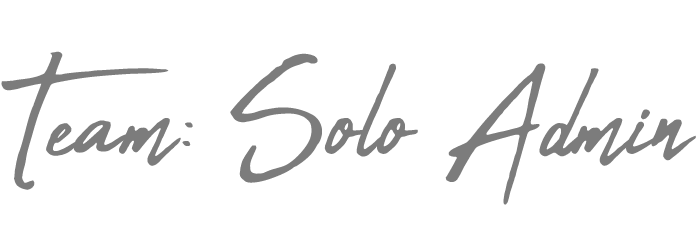I’m sure you’ve seen it. “Other administrative duties as needed” – the beginning of “the gray area.” The gray area is the unpleasant realm of job responsibility uncertainty.
“Other administrative duties as needed” in job descriptions is one of my biggest pet peeves because it somehow, single-handedly, gives companies, organizations, and management (COMs) a free pass to assign you anything and demand more from you without the need to address your workload, pay, or skillset.
For the record, I have an extreme love/hate relationship with the gray area. But, in all fairness, it’s not the gray area’s fault. I place the BLAME on the shoulders of the person(s) who has the authority to manage you and your job.
We’ll focus this entry on the phrase “other administrative duties as needed.”
Practical Application
The use of the phrase made so much sense when I realized what it actually was – a tool for COMs. This tool is the holy grail to include in admin job postings for COMs. Some COMs use this as a “catch all” to cover their asses to ensure there is someone to do a task they haven’t thought of yet, and be able to justify new tasks as “the admin’s job.”
To be honest, it makes perfect sense to use, but without regulation or specific attention paid to its boundaries, those in authority can easily (and have) misuse it. There is a line between “just another small task” and a job creep violation. When misused, OADAN can morph into a toxic, demoralizing, and pervasive disease in an admin’s work life.
Let’s break it down into smaller chunks.
Other Administrative Duties As Needed | The Breakdown
Okay, y’all. Let’s be real for a moment. Admins (just as EVERY OTHER employee) should assume, understand, and accept there will be tasks that will need to perform not specifically mentioned on their job posting.
That’s called teamwork.
Admin positions exist in almost every industry. Therefore, the profession requires us to have many skills at our disposal.
Industry-specific employees (ie: doctors, real estate agents, faculty, scientists, etc) were educated and trained typically in their area of expertise. That’s not to say all industry-specific employees know nothing other than their industry (those are lovely hidden gems), but their area of knowledge and familiarity might not be as wide as an admin’s. Plain and simple.
We are masters at being the jack of all trades, and are damn proud of it.
In many ways, it is the nature of an admin’s job to “fill in the administrative gaps.”
We cover the areas of the business to keep the organization going. This is where our professional impact shines the brightest.
For many of us admins, being the behind-the-scenes hero makes our little admin hearts fill with pride and joy.

We put so much care, effort, and detail into our actions that we can take it personally and consider it disrespectful when COMs don’t respect the job’s nature and process.
Yes, our job is to support, but if we do not have the time, knowledge, skills to do the actual job, we feel like we fail. Some of us may know it’s not our fault, but the feeling is still shitty.
COMs have to support the support to be best supported.
It is a matter of common courtesy to:
- Discuss new tasks/projects with us,
- Give us an opportunity to understand the task’s relevance to our specific job, and/or
- Decline a task (if necessary) without retaliation or being considered insubordinate, say, for example, if the makes us feel uncomfortable.
Behavior like this from COMs can sow the seed of resentment – maybe not at first, but definitely over time.
Other Administrative Duties As Needed: The Perception
Okay, okay, COMs are smart to use this phrase. I mean, the phrase itself isn’t inherently bad; the way people have misused it is.
More experienced admins who apply for jobs with descriptions that included OADAN know how to recognize the significance of OADAN and to “ask more questions.” It’s sus alert #1. If we or someone we know has been burned because of this, we are more aware.
Don’t get me wrong, we HOPE that’s not the case, but that phrase immediately lets us know that digging a LOT deeper in interviews is crucial to our future professional happiness.
You’re not clever, COMs. We did notice. We see you.

But, for the sake of moving this article along, let’s say it’s still a great sounding position and there are other aspects of the job really interest us, so we persevere! (We do tend to over-think things after all.) WHO SAID THAT?!?!
Note: I’m going to skip over the interview part here because I’m sure you’re not trying to read a whole book in one blog post, but BELIEVE me I’ll be covering that on this blog in future.
BOOM, we get the job (naturally).
OADAN in the Wild
We start with an aim to learn everything (past, present, and future) about the position so we can organize our work and work processes to help us function better so we can be more effective to COMs.
But as OADAN was in that job description, the gray area cloud has already formed somewhere in my mind.
We know there are areas of “unknown” that they might request us to perform. Requests that exist outside of and in addition to the normal extra tasks.
And it’s annoying!!
It’s like…walking into a spider web outside. Did it mess up your walk? No. Can you see it? No, but you feel it. You can try to rid yourself of it as best you can and consciously decide to ignore the thought that a spider is turning your head into their new home. GROSS!
Anyhoo, you’re working, ya know, as we do.
Everything is great! No problems. You’ve been able to put OADAN so far back in your mind that you’ve almost forgotten about it. Then it happens – the OADAN task.
The OADAN task usually involves an unexplained task that “doesn’t seem to fit” in your expectation of your position. No warning. No discussion. They assign the task to you in “that way” which is technically a request.
But it isn’t a request.
They say it to you that way because in their mind, “you have to do it.” Sometimes, you can even tell they are aware it’s a stretch by their delivery.
Your mind races. “Is this my job,” “How does this even fit,” “This is so unrelated,” “I’m freaking swamped right now,” “Are they being serious” “That’s not my job!!!” You decide to give them the benefit of the doubt, and ask more questions to understand why they would ask you to do this task.
Side Note
And I know what some you are going to say, “We’re not even supposed to think, ‘That’s not my job!'”
Well, I just did.
Because even if we’re not supposed to say it out loud (much less think it), it DOESN’T mean we’re not still thinking it. That’s what this blog is for! We’re going to say the things – all the things. If I don’t, I’m just continuing to do what we’ve always done. Stay quiet and complacent (and eventually resentful).
Most admins, myself included, shy away from protesting too much. We don’t want to get yelled at (no one does!). Most admins are uncomfortable with conflict, and would consider it less problematic to just do the task.
While I would prefer to not get the attitude, I’m mostly okay with conflict. I, personally, just don’t want to deal with childish temper tantrums, and I don’t know if they are grudge holders or not (which is a whole other issue).
This could have a variety of reactions. They could:
- get defensive, irritated or mad that you had the audacity to even ask.
- snap and say, “it’s your job.”
- try to make up a justification on the fly
- actually try to explain the task and how it ended up being assigned to you. (Winner)
- Address that the fact that it seems out of your area, and discuss why it was assigned to you (Winner #2)
But the one I HATE THE MOST is when they show you the job description you applied for via email or face to face and point out “other administrative duties as necessary.”
To that I say, “Kick rocks, COMs.”

That’s a jerk move. We both know there have been already a BUNCH of different tasks NOT on that sheet of paper that I’ve completed without question, and most likely with enthusiasm. Rude, spiteful, and unprofessional tantrums are uncalled for, that response is petty, demeaning, and demoralizing. Kick all the rocks.
IT IS CRAZY HOW MANY TIMES MY SUPERIORS HAVE THROWN TANTRUMS. It still baffles me how they get away with it.
Hopefully, the majority of you haven’t experienced this. But if you, or someone you know has had this happen, it leaves an indelible mark in your administrative book of experiences.
Conclusion: Other Administrative Duties As Needed
While OADAN is not the only cause of the “grey area,” it is a gateway that gives bad COMs the ability to misuse their position.
It passively subjects admins to perform tasks without the opportunity to discuss or defend themselves professionally, while simultaneously gives COMs more freedom and silent consent to justify bad, unfair behavior and poor judgment.
There is nothing wrong with explaining the expectations of COMs from an administrative support’s position both before they are hired. It is a matter of courtesy and respect to listen to the concerns of those to report to you, especially as the responsibilities of the job change over time.
It a matter of mutual respect for the position, the profession, and the person.
When COMs take advantage of their role and misuse OADAN, that’s when the jobs starts to suck.
I really appreciate you being here and hope you enjoy the blog!
If you have any topic suggestions, please let me know here. To sign up for our email list, click here.


